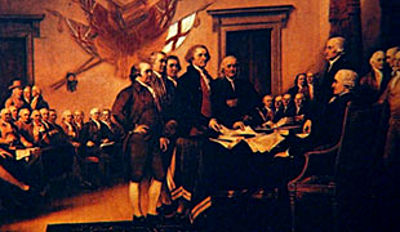Psalm on Every Street
Whitefield stayed at Benjamin Franklin’s home while preaching in Philadelphia. Franklin wrote of the revival’s impact.
“From being thoughtless or indifferent about religion, it seemed as if all the world were growing religious, so that one could not walk through the town in an evening without hearing psalms sung in different families of every street,” Franklin wrote.
Whitefield was praying a special prayer at this time for the colonies that would make a huge difference in their Revolution and future together.
Hyatt said Whitefield was praying that “they would not live as 13 scattered colonies, but as one nation under God.”
And indeed the Great Awakening became the first national event the scattered colonies experienced as one. It unified them unlike any time before just in time to face the mighty British empire in war.
The revival also shaped the Founding Fathers core vision for America: that God sets men free, it’s their natural right to have liberty and each is made to rule with Christ.
Its influence is all over the Declaration of Independence, U.S. Constitution, and Bill of Rights.
As he studied the founders, Hyatt found example after example of how deeply this Awakening influenced them and their Christian values. Take Thomas Jefferson for instance.
“He signed all presidential documents ‘in the year of our Lord Christ,'” Hyatt explained.
Jefferson signed off on sending Christian missionaries to one Indian tribe and gave that tribe federal funds to build a church. He also attended Sunday services that met right inside the House of Representatives.
Hyatt pointed out these are hardly the acts of a man wanting to put a huge wall of separation between religion and government, as many portray Jefferson today.
Washington on His Knees, Praying
Today some scholars write doubtfully about the first president’s faith. But a Quaker named Isaac Potts who lived near Valley Forge saw George Washington’s faith up close during that cruel winter that almost froze the general’s colonial army to death during the Revolution.
“I tied my horse to a sapling and went quietly into the woods, and to my astonishment I saw the great George Washington on his knees alone,” Potts wrote. “He was at prayer to the God of the armies of heaven, beseeching Him to interpose with His divine aid, and for the cause of the country and of humanity, and for the whole world.”
“Such a prayer I never heard from the lips of man…We never thought a man could be a soldier and a Christian, but if there is one in the world, it is Washington,” Potts, who was anti-war like most Quakers, continued.
At the Constitutional Convention in 1787, the delegates fought and bickered so bitterly, the convention almost broke up.
But then Ben Franklin stood and began to preach.
“The longer I live, the more convincing proofs I see of this truth: that God governs in the affairs of men,” the aging founding father reportedly said. “And if a sparrow cannot fall to the ground without His notice, is it probable that an empire can rise without His aid?”
Then Franklin beseeched them to pray together at the start of every day. After that, an atmosphere of peace and reconciliation came upon the founders.
“And they were able to proceed,” Hyatt said. “And to finish their job of hammering out the American Constitution and Bill of Rights—and in a context of prayer.”
“I would say virtually all the founders directly, indirectly to one degree or another, they were affected, they were impacted by the Great Awakening,” he said.
A National Spiritual Awakening
As America moved into the 1800s, its spiritual fervor began to chill again, and like before, desperate men prayed for revival.
It hit, starting at Yale where a third of the students were saved before it burst out on other campuses. Then it spread across the whole growing country, even out on the frontier.
Hyatt told CBN News what one Methodist circuit rider wrote about what he saw: “He said, ‘It seemed like the whole country was coming to God.'”
Hyatt suggest in his book on revivals in early America this Second Great Awakening saved America from the influence of the bloody French Revolution, from Deism – the belief that God exists but is a distant, unconcerned entity—and the wild bawdiness of the Wild West.
Yet another revival hit in the late 1850s, just in time to cushion the blow of the mighty Civil War that almost ripped the nation apart.
“There have been Awakenings at different times. God has come at crucial times,” Hyatt stated. “And I’m praying that God will use my book to help ignite a new desire and passion and vision in Christians that America can see another national spiritual Awakening.”








































